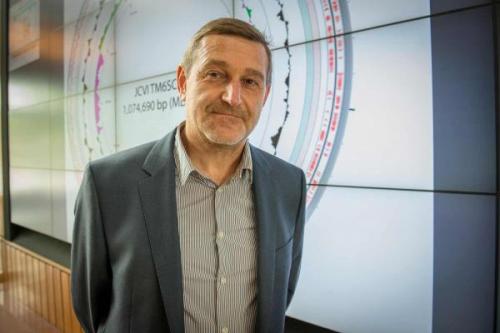
Pavel Pevzner, Ronald R. Taylor Professor of Computer Science in UC San Diego’s Computer Science and Engineering Department, has been awarded a $300,000 grant, through the National Science Foundation’s EArly-concept Grants for Exploratory Research (EAGER) program. The grant will support efforts to investigate immune system genes in humans, bats and other mammals and identify successful antibody responses against SARS-COV-2.
The project, called Assembling the Immunoglobulin Loci Across Mammalian Species and Across the Human Population, seeks to generate immunoglobulin (Ig) locus sequences, which vary across human populations. The project will also analyze this genomic region in mammals to better understand how different species generate antiviral antibodies.
“The immunoglobulin locus is complex, making it difficult to assemble its genomic sequence and find all the immune genes hiding there,” said Pevzner. “Since these genes represent a template to generate antibodies, the lack of Ig assemblies has been a barrier to antibody engineering and vaccine testing. This project seeks to develop the first specialized software tools to assemble and annotate the immunoglobulin locus in humans and other mammalian species.”
To illuminate the genomics behind antiviral immune responses, Pevzner’s team will develop a new algorithm to analyze personalized immune genes that have shown strong immunological responses.
The Ig locus contains variable immune genes – called V, D and J – that can rearrange in different configurations to encode around 100 million unique, circulating human antibodies. Each one is a mosaic of V, D, and J genes, making it virtually impossible to study an organism’s antibody repertoire and infection response without decoding the nucleotide sequences in the locus. Personalized immunogenomics seeks to analyze how V, D, and J gene variations affect individual immune responses.
Other mammals may also provide important insights. Bats have much greater immune gene diversity than humans, but still have no accurate Ig loci assemblies, making it difficult to study how they generate antibodies to cope with multiple viruses. The group will also analyze the Ig locus in llamas, which could provide promising antibodies against COVID-19.
The Pevzner group will also work with immunogenomics experts to analyze Ig loci in COVID-19 patients, looking for helpful mutations. To disseminate the team’s findings, the grant will also fund a new Coursera class: Bioinformatics of SARS-COV-2.
“The deadly COVID-19 pandemic has shown that we need to develop novel bioinformatic techniques to understand how different mammals respond to various viruses to help us develop better therapeutics,” said Pevzner. “These tools will support ongoing efforts to sequence Ig loci in COVID-19 patients and to understand why some patients are able to generate effective anti-viral antibodies and others fail.”

